Early Childhood Education Advocacy Action Plan: Funding Challenges
VerifiedAdded on 2022/11/22
|8
|1988
|53
Project
AI Summary
This assignment presents an action plan aimed at advocating for children with additional needs in early childhood education, specifically addressing the issue of insufficient funding for those who do not qualify. The plan outlines the critical role of early childhood education programs in identifying developmental issues and the necessity of securing funding to ensure the protection of children's and families' rights. It emphasizes the importance of collaboration among schools, specialists, educators, and parents to provide essential services, even when funding is limited. The plan identifies key objectives, including early detection of developmental delays and ensuring access to intervention services, and details strategies such as system and school interventions, community-based approaches, and parental involvement. It also defines the responsibilities of schools, communities, and professional development initiatives, highlighting the importance of resources and agencies in supporting children with special needs. The action plan provides a comprehensive framework for addressing the advocacy issue, promoting quality education and support for children with additional needs.

Running head: ADVOCACY 1
Advocacy
Name
Institution
Advocacy
Name
Institution
Paraphrase This Document
Need a fresh take? Get an instant paraphrase of this document with our AI Paraphraser
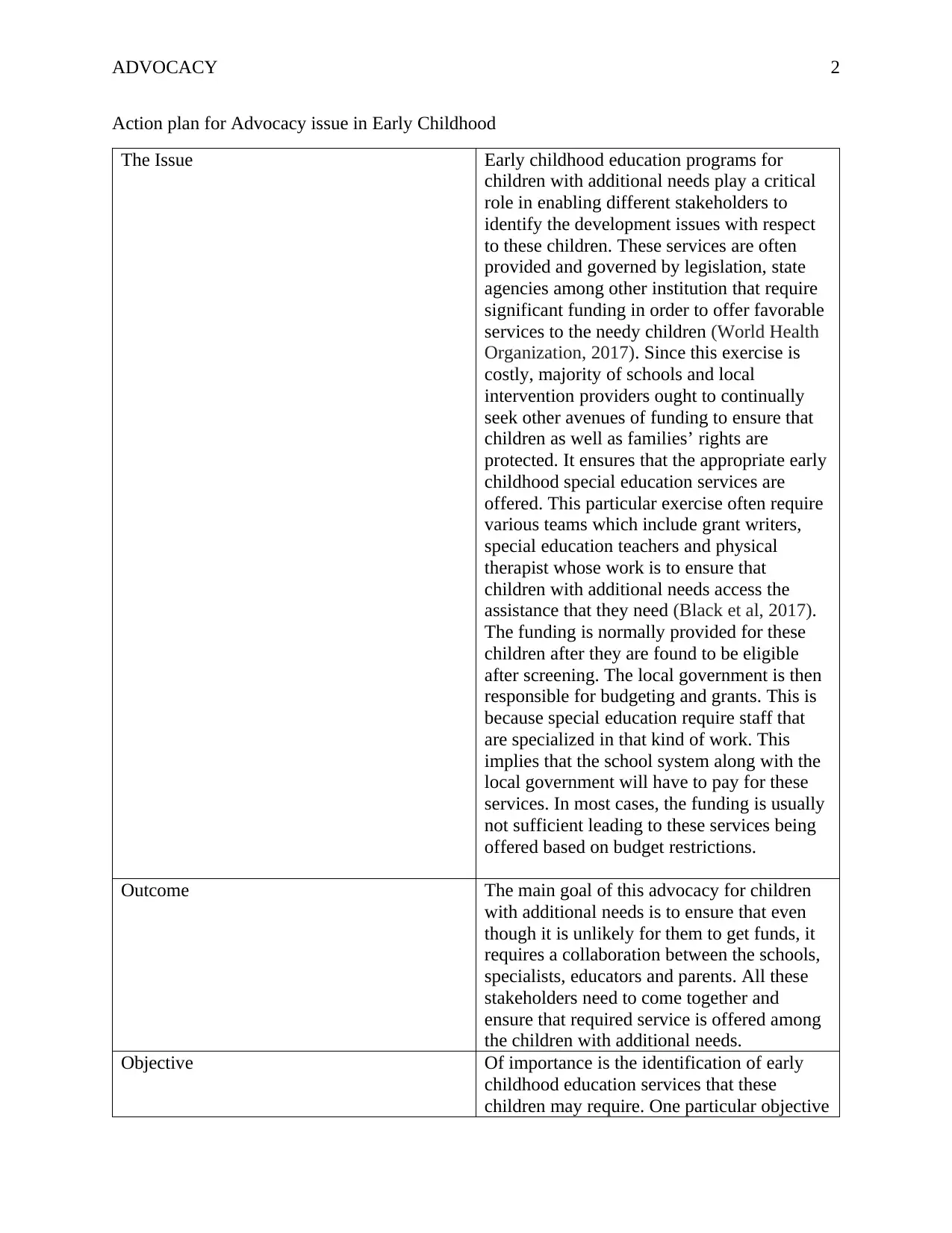
ADVOCACY 2
Action plan for Advocacy issue in Early Childhood
The Issue Early childhood education programs for
children with additional needs play a critical
role in enabling different stakeholders to
identify the development issues with respect
to these children. These services are often
provided and governed by legislation, state
agencies among other institution that require
significant funding in order to offer favorable
services to the needy children (World Health
Organization, 2017). Since this exercise is
costly, majority of schools and local
intervention providers ought to continually
seek other avenues of funding to ensure that
children as well as families’ rights are
protected. It ensures that the appropriate early
childhood special education services are
offered. This particular exercise often require
various teams which include grant writers,
special education teachers and physical
therapist whose work is to ensure that
children with additional needs access the
assistance that they need (Black et al, 2017).
The funding is normally provided for these
children after they are found to be eligible
after screening. The local government is then
responsible for budgeting and grants. This is
because special education require staff that
are specialized in that kind of work. This
implies that the school system along with the
local government will have to pay for these
services. In most cases, the funding is usually
not sufficient leading to these services being
offered based on budget restrictions.
Outcome The main goal of this advocacy for children
with additional needs is to ensure that even
though it is unlikely for them to get funds, it
requires a collaboration between the schools,
specialists, educators and parents. All these
stakeholders need to come together and
ensure that required service is offered among
the children with additional needs.
Objective Of importance is the identification of early
childhood education services that these
children may require. One particular objective
Action plan for Advocacy issue in Early Childhood
The Issue Early childhood education programs for
children with additional needs play a critical
role in enabling different stakeholders to
identify the development issues with respect
to these children. These services are often
provided and governed by legislation, state
agencies among other institution that require
significant funding in order to offer favorable
services to the needy children (World Health
Organization, 2017). Since this exercise is
costly, majority of schools and local
intervention providers ought to continually
seek other avenues of funding to ensure that
children as well as families’ rights are
protected. It ensures that the appropriate early
childhood special education services are
offered. This particular exercise often require
various teams which include grant writers,
special education teachers and physical
therapist whose work is to ensure that
children with additional needs access the
assistance that they need (Black et al, 2017).
The funding is normally provided for these
children after they are found to be eligible
after screening. The local government is then
responsible for budgeting and grants. This is
because special education require staff that
are specialized in that kind of work. This
implies that the school system along with the
local government will have to pay for these
services. In most cases, the funding is usually
not sufficient leading to these services being
offered based on budget restrictions.
Outcome The main goal of this advocacy for children
with additional needs is to ensure that even
though it is unlikely for them to get funds, it
requires a collaboration between the schools,
specialists, educators and parents. All these
stakeholders need to come together and
ensure that required service is offered among
the children with additional needs.
Objective Of importance is the identification of early
childhood education services that these
children may require. One particular objective
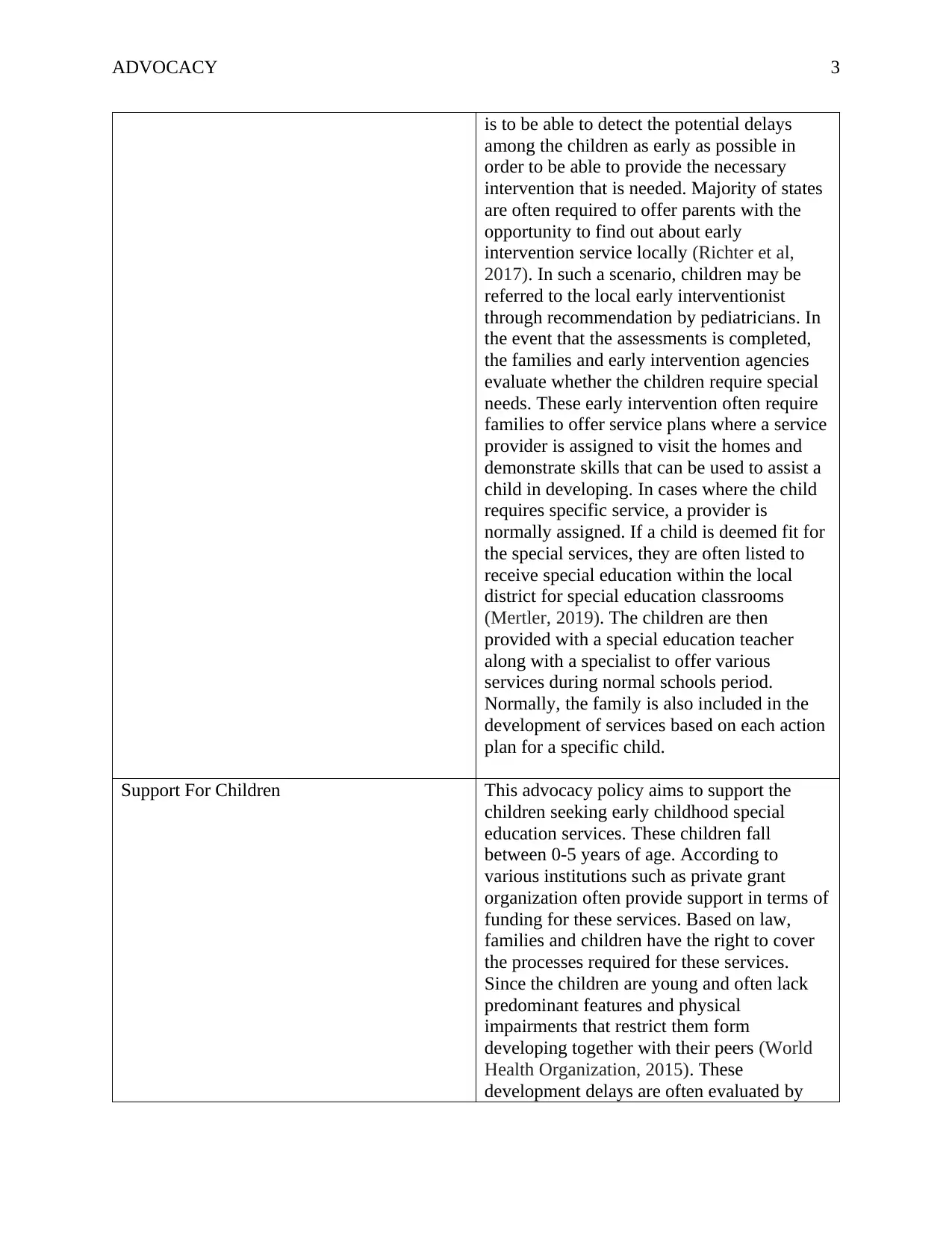
ADVOCACY 3
is to be able to detect the potential delays
among the children as early as possible in
order to be able to provide the necessary
intervention that is needed. Majority of states
are often required to offer parents with the
opportunity to find out about early
intervention service locally (Richter et al,
2017). In such a scenario, children may be
referred to the local early interventionist
through recommendation by pediatricians. In
the event that the assessments is completed,
the families and early intervention agencies
evaluate whether the children require special
needs. These early intervention often require
families to offer service plans where a service
provider is assigned to visit the homes and
demonstrate skills that can be used to assist a
child in developing. In cases where the child
requires specific service, a provider is
normally assigned. If a child is deemed fit for
the special services, they are often listed to
receive special education within the local
district for special education classrooms
(Mertler, 2019). The children are then
provided with a special education teacher
along with a specialist to offer various
services during normal schools period.
Normally, the family is also included in the
development of services based on each action
plan for a specific child.
Support For Children This advocacy policy aims to support the
children seeking early childhood special
education services. These children fall
between 0-5 years of age. According to
various institutions such as private grant
organization often provide support in terms of
funding for these services. Based on law,
families and children have the right to cover
the processes required for these services.
Since the children are young and often lack
predominant features and physical
impairments that restrict them form
developing together with their peers (World
Health Organization, 2015). These
development delays are often evaluated by
is to be able to detect the potential delays
among the children as early as possible in
order to be able to provide the necessary
intervention that is needed. Majority of states
are often required to offer parents with the
opportunity to find out about early
intervention service locally (Richter et al,
2017). In such a scenario, children may be
referred to the local early interventionist
through recommendation by pediatricians. In
the event that the assessments is completed,
the families and early intervention agencies
evaluate whether the children require special
needs. These early intervention often require
families to offer service plans where a service
provider is assigned to visit the homes and
demonstrate skills that can be used to assist a
child in developing. In cases where the child
requires specific service, a provider is
normally assigned. If a child is deemed fit for
the special services, they are often listed to
receive special education within the local
district for special education classrooms
(Mertler, 2019). The children are then
provided with a special education teacher
along with a specialist to offer various
services during normal schools period.
Normally, the family is also included in the
development of services based on each action
plan for a specific child.
Support For Children This advocacy policy aims to support the
children seeking early childhood special
education services. These children fall
between 0-5 years of age. According to
various institutions such as private grant
organization often provide support in terms of
funding for these services. Based on law,
families and children have the right to cover
the processes required for these services.
Since the children are young and often lack
predominant features and physical
impairments that restrict them form
developing together with their peers (World
Health Organization, 2015). These
development delays are often evaluated by
⊘ This is a preview!⊘
Do you want full access?
Subscribe today to unlock all pages.

Trusted by 1+ million students worldwide
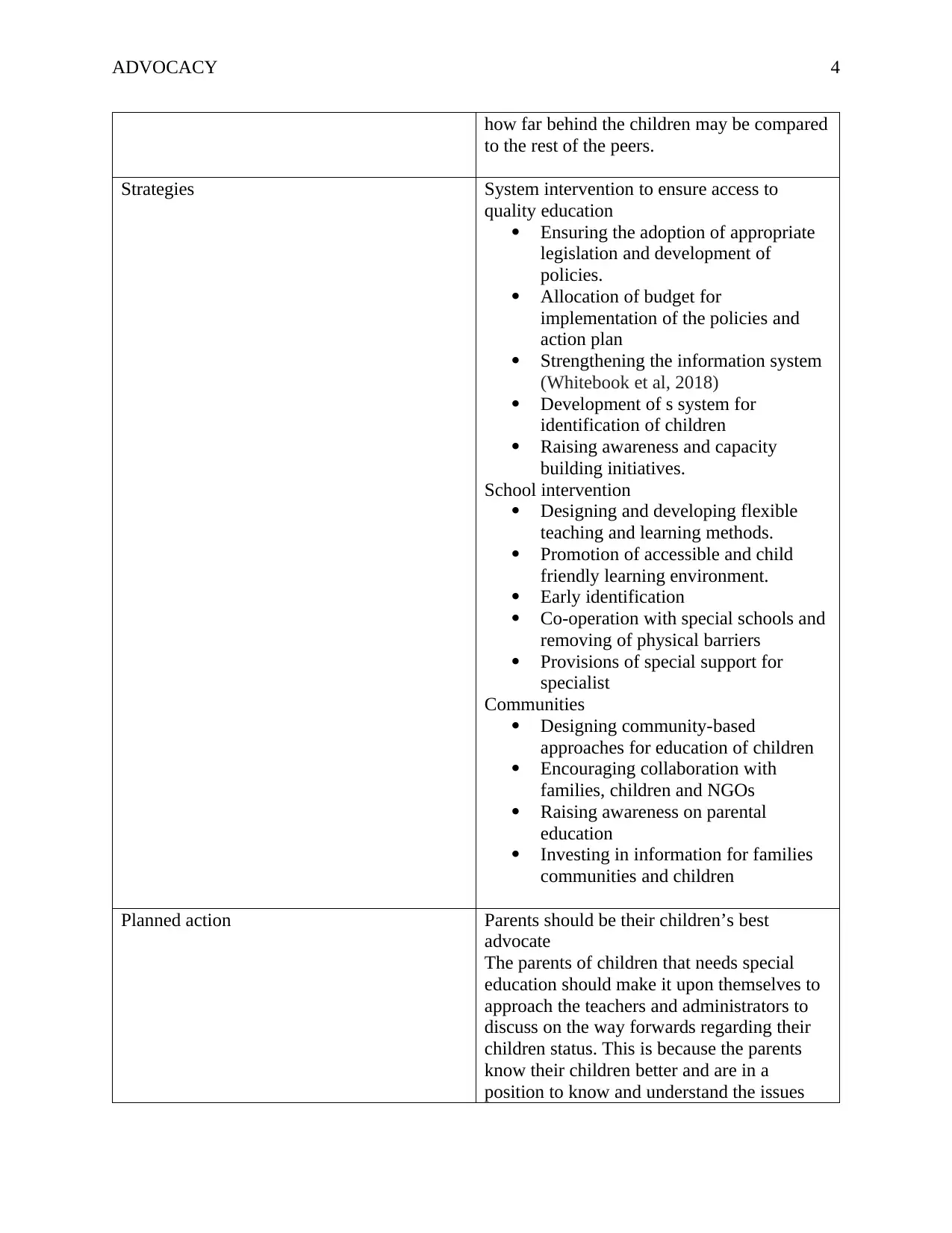
ADVOCACY 4
how far behind the children may be compared
to the rest of the peers.
Strategies System intervention to ensure access to
quality education
Ensuring the adoption of appropriate
legislation and development of
policies.
Allocation of budget for
implementation of the policies and
action plan
Strengthening the information system
(Whitebook et al, 2018)
Development of s system for
identification of children
Raising awareness and capacity
building initiatives.
School intervention
Designing and developing flexible
teaching and learning methods.
Promotion of accessible and child
friendly learning environment.
Early identification
Co-operation with special schools and
removing of physical barriers
Provisions of special support for
specialist
Communities
Designing community-based
approaches for education of children
Encouraging collaboration with
families, children and NGOs
Raising awareness on parental
education
Investing in information for families
communities and children
Planned action Parents should be their children’s best
advocate
The parents of children that needs special
education should make it upon themselves to
approach the teachers and administrators to
discuss on the way forwards regarding their
children status. This is because the parents
know their children better and are in a
position to know and understand the issues
how far behind the children may be compared
to the rest of the peers.
Strategies System intervention to ensure access to
quality education
Ensuring the adoption of appropriate
legislation and development of
policies.
Allocation of budget for
implementation of the policies and
action plan
Strengthening the information system
(Whitebook et al, 2018)
Development of s system for
identification of children
Raising awareness and capacity
building initiatives.
School intervention
Designing and developing flexible
teaching and learning methods.
Promotion of accessible and child
friendly learning environment.
Early identification
Co-operation with special schools and
removing of physical barriers
Provisions of special support for
specialist
Communities
Designing community-based
approaches for education of children
Encouraging collaboration with
families, children and NGOs
Raising awareness on parental
education
Investing in information for families
communities and children
Planned action Parents should be their children’s best
advocate
The parents of children that needs special
education should make it upon themselves to
approach the teachers and administrators to
discuss on the way forwards regarding their
children status. This is because the parents
know their children better and are in a
position to know and understand the issues
Paraphrase This Document
Need a fresh take? Get an instant paraphrase of this document with our AI Paraphraser
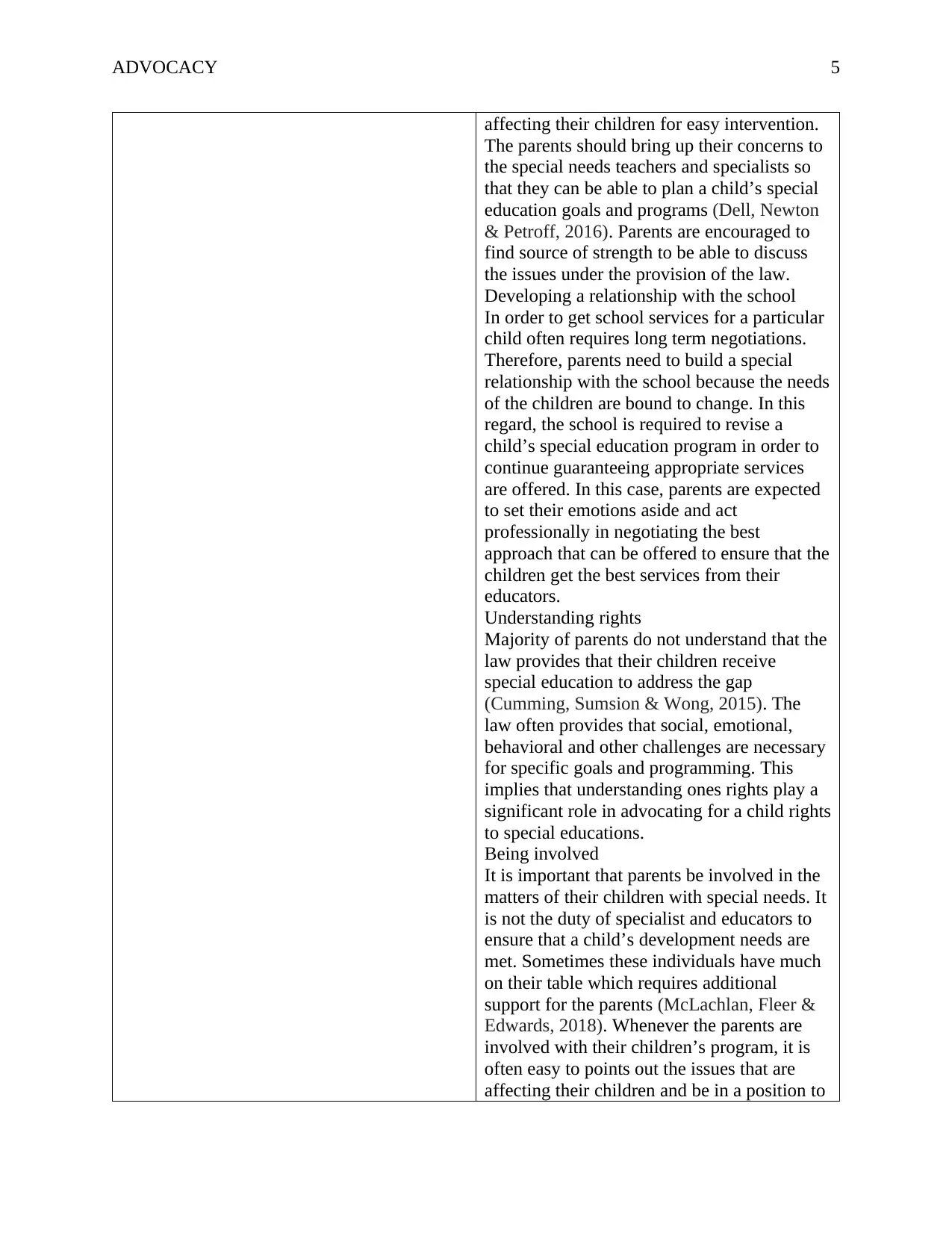
ADVOCACY 5
affecting their children for easy intervention.
The parents should bring up their concerns to
the special needs teachers and specialists so
that they can be able to plan a child’s special
education goals and programs (Dell, Newton
& Petroff, 2016). Parents are encouraged to
find source of strength to be able to discuss
the issues under the provision of the law.
Developing a relationship with the school
In order to get school services for a particular
child often requires long term negotiations.
Therefore, parents need to build a special
relationship with the school because the needs
of the children are bound to change. In this
regard, the school is required to revise a
child’s special education program in order to
continue guaranteeing appropriate services
are offered. In this case, parents are expected
to set their emotions aside and act
professionally in negotiating the best
approach that can be offered to ensure that the
children get the best services from their
educators.
Understanding rights
Majority of parents do not understand that the
law provides that their children receive
special education to address the gap
(Cumming, Sumsion & Wong, 2015). The
law often provides that social, emotional,
behavioral and other challenges are necessary
for specific goals and programming. This
implies that understanding ones rights play a
significant role in advocating for a child rights
to special educations.
Being involved
It is important that parents be involved in the
matters of their children with special needs. It
is not the duty of specialist and educators to
ensure that a child’s development needs are
met. Sometimes these individuals have much
on their table which requires additional
support for the parents (McLachlan, Fleer &
Edwards, 2018). Whenever the parents are
involved with their children’s program, it is
often easy to points out the issues that are
affecting their children and be in a position to
affecting their children for easy intervention.
The parents should bring up their concerns to
the special needs teachers and specialists so
that they can be able to plan a child’s special
education goals and programs (Dell, Newton
& Petroff, 2016). Parents are encouraged to
find source of strength to be able to discuss
the issues under the provision of the law.
Developing a relationship with the school
In order to get school services for a particular
child often requires long term negotiations.
Therefore, parents need to build a special
relationship with the school because the needs
of the children are bound to change. In this
regard, the school is required to revise a
child’s special education program in order to
continue guaranteeing appropriate services
are offered. In this case, parents are expected
to set their emotions aside and act
professionally in negotiating the best
approach that can be offered to ensure that the
children get the best services from their
educators.
Understanding rights
Majority of parents do not understand that the
law provides that their children receive
special education to address the gap
(Cumming, Sumsion & Wong, 2015). The
law often provides that social, emotional,
behavioral and other challenges are necessary
for specific goals and programming. This
implies that understanding ones rights play a
significant role in advocating for a child rights
to special educations.
Being involved
It is important that parents be involved in the
matters of their children with special needs. It
is not the duty of specialist and educators to
ensure that a child’s development needs are
met. Sometimes these individuals have much
on their table which requires additional
support for the parents (McLachlan, Fleer &
Edwards, 2018). Whenever the parents are
involved with their children’s program, it is
often easy to points out the issues that are
affecting their children and be in a position to
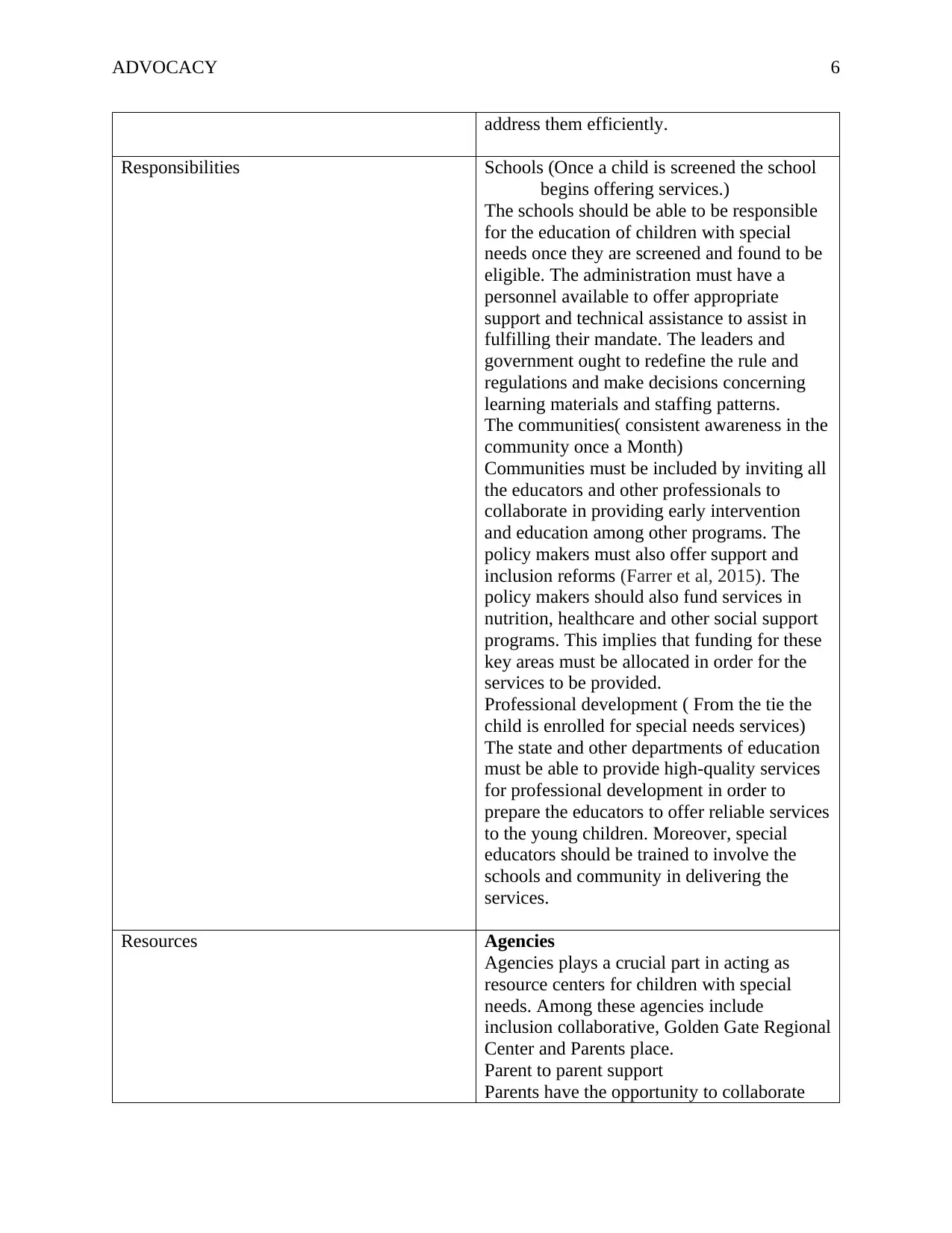
ADVOCACY 6
address them efficiently.
Responsibilities Schools (Once a child is screened the school
begins offering services.)
The schools should be able to be responsible
for the education of children with special
needs once they are screened and found to be
eligible. The administration must have a
personnel available to offer appropriate
support and technical assistance to assist in
fulfilling their mandate. The leaders and
government ought to redefine the rule and
regulations and make decisions concerning
learning materials and staffing patterns.
The communities( consistent awareness in the
community once a Month)
Communities must be included by inviting all
the educators and other professionals to
collaborate in providing early intervention
and education among other programs. The
policy makers must also offer support and
inclusion reforms (Farrer et al, 2015). The
policy makers should also fund services in
nutrition, healthcare and other social support
programs. This implies that funding for these
key areas must be allocated in order for the
services to be provided.
Professional development ( From the tie the
child is enrolled for special needs services)
The state and other departments of education
must be able to provide high-quality services
for professional development in order to
prepare the educators to offer reliable services
to the young children. Moreover, special
educators should be trained to involve the
schools and community in delivering the
services.
Resources Agencies
Agencies plays a crucial part in acting as
resource centers for children with special
needs. Among these agencies include
inclusion collaborative, Golden Gate Regional
Center and Parents place.
Parent to parent support
Parents have the opportunity to collaborate
address them efficiently.
Responsibilities Schools (Once a child is screened the school
begins offering services.)
The schools should be able to be responsible
for the education of children with special
needs once they are screened and found to be
eligible. The administration must have a
personnel available to offer appropriate
support and technical assistance to assist in
fulfilling their mandate. The leaders and
government ought to redefine the rule and
regulations and make decisions concerning
learning materials and staffing patterns.
The communities( consistent awareness in the
community once a Month)
Communities must be included by inviting all
the educators and other professionals to
collaborate in providing early intervention
and education among other programs. The
policy makers must also offer support and
inclusion reforms (Farrer et al, 2015). The
policy makers should also fund services in
nutrition, healthcare and other social support
programs. This implies that funding for these
key areas must be allocated in order for the
services to be provided.
Professional development ( From the tie the
child is enrolled for special needs services)
The state and other departments of education
must be able to provide high-quality services
for professional development in order to
prepare the educators to offer reliable services
to the young children. Moreover, special
educators should be trained to involve the
schools and community in delivering the
services.
Resources Agencies
Agencies plays a crucial part in acting as
resource centers for children with special
needs. Among these agencies include
inclusion collaborative, Golden Gate Regional
Center and Parents place.
Parent to parent support
Parents have the opportunity to collaborate
⊘ This is a preview!⊘
Do you want full access?
Subscribe today to unlock all pages.

Trusted by 1+ million students worldwide
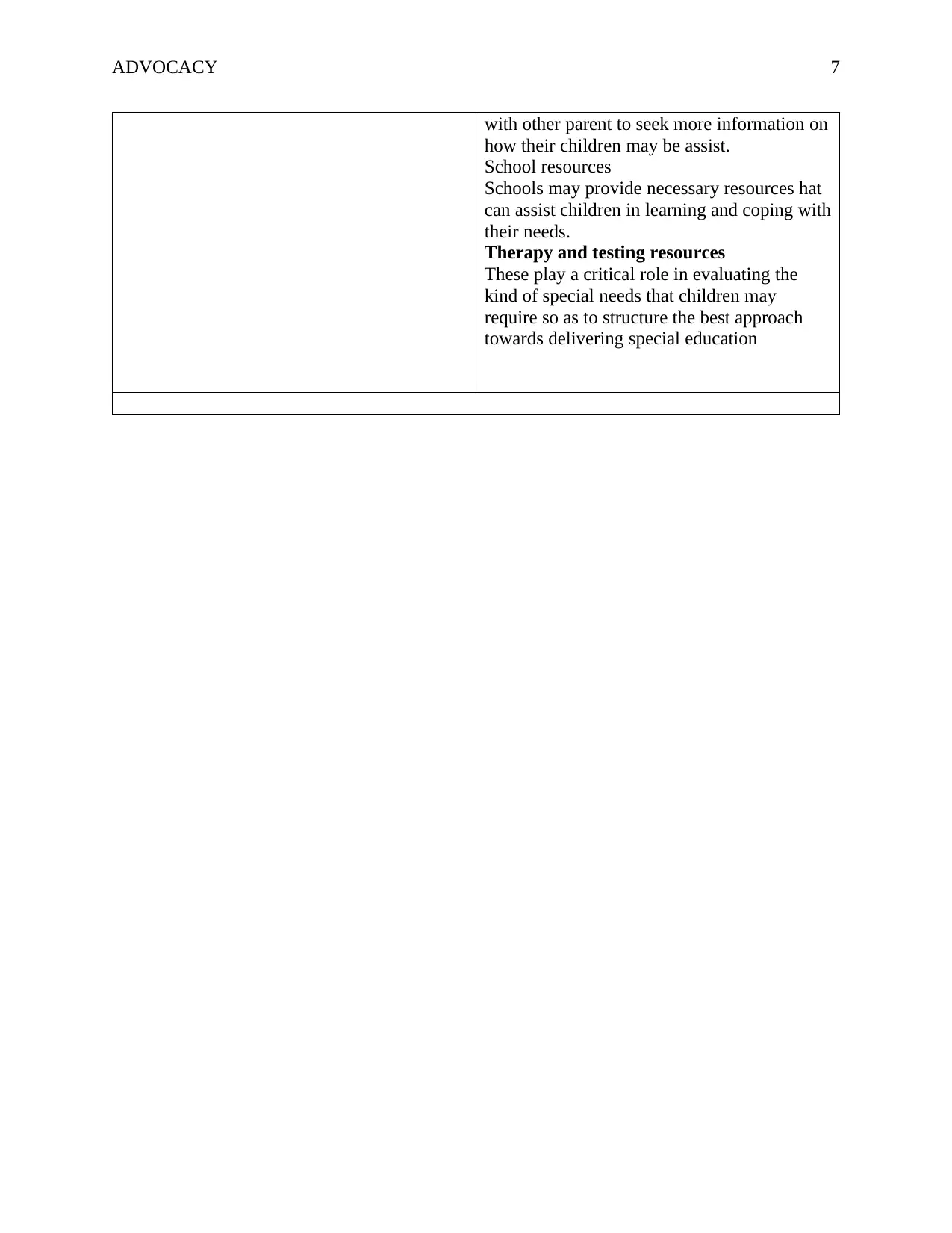
ADVOCACY 7
with other parent to seek more information on
how their children may be assist.
School resources
Schools may provide necessary resources hat
can assist children in learning and coping with
their needs.
Therapy and testing resources
These play a critical role in evaluating the
kind of special needs that children may
require so as to structure the best approach
towards delivering special education
with other parent to seek more information on
how their children may be assist.
School resources
Schools may provide necessary resources hat
can assist children in learning and coping with
their needs.
Therapy and testing resources
These play a critical role in evaluating the
kind of special needs that children may
require so as to structure the best approach
towards delivering special education
Paraphrase This Document
Need a fresh take? Get an instant paraphrase of this document with our AI Paraphraser
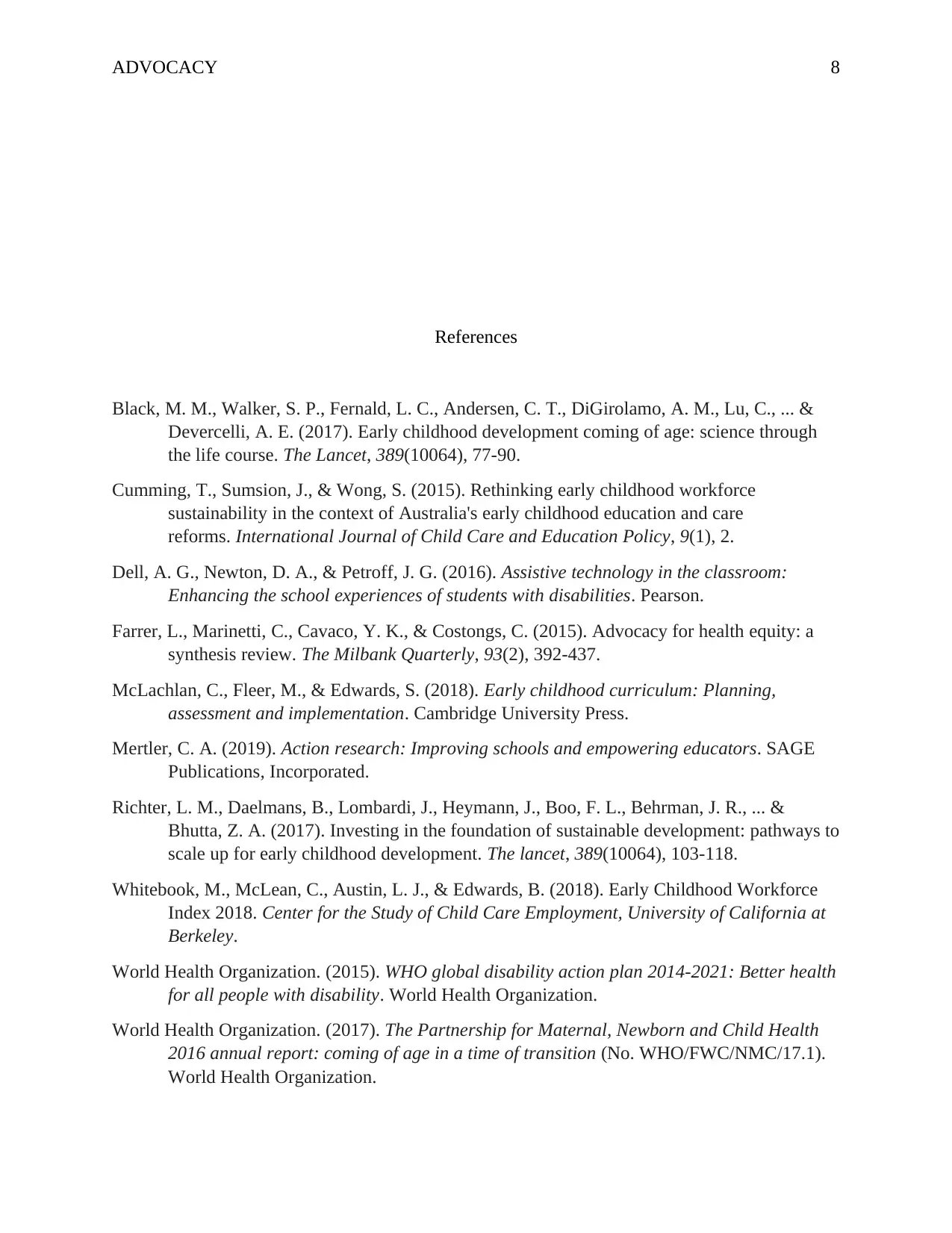
ADVOCACY 8
References
Black, M. M., Walker, S. P., Fernald, L. C., Andersen, C. T., DiGirolamo, A. M., Lu, C., ... &
Devercelli, A. E. (2017). Early childhood development coming of age: science through
the life course. The Lancet, 389(10064), 77-90.
Cumming, T., Sumsion, J., & Wong, S. (2015). Rethinking early childhood workforce
sustainability in the context of Australia's early childhood education and care
reforms. International Journal of Child Care and Education Policy, 9(1), 2.
Dell, A. G., Newton, D. A., & Petroff, J. G. (2016). Assistive technology in the classroom:
Enhancing the school experiences of students with disabilities. Pearson.
Farrer, L., Marinetti, C., Cavaco, Y. K., & Costongs, C. (2015). Advocacy for health equity: a
synthesis review. The Milbank Quarterly, 93(2), 392-437.
McLachlan, C., Fleer, M., & Edwards, S. (2018). Early childhood curriculum: Planning,
assessment and implementation. Cambridge University Press.
Mertler, C. A. (2019). Action research: Improving schools and empowering educators. SAGE
Publications, Incorporated.
Richter, L. M., Daelmans, B., Lombardi, J., Heymann, J., Boo, F. L., Behrman, J. R., ... &
Bhutta, Z. A. (2017). Investing in the foundation of sustainable development: pathways to
scale up for early childhood development. The lancet, 389(10064), 103-118.
Whitebook, M., McLean, C., Austin, L. J., & Edwards, B. (2018). Early Childhood Workforce
Index 2018. Center for the Study of Child Care Employment, University of California at
Berkeley.
World Health Organization. (2015). WHO global disability action plan 2014-2021: Better health
for all people with disability. World Health Organization.
World Health Organization. (2017). The Partnership for Maternal, Newborn and Child Health
2016 annual report: coming of age in a time of transition (No. WHO/FWC/NMC/17.1).
World Health Organization.
References
Black, M. M., Walker, S. P., Fernald, L. C., Andersen, C. T., DiGirolamo, A. M., Lu, C., ... &
Devercelli, A. E. (2017). Early childhood development coming of age: science through
the life course. The Lancet, 389(10064), 77-90.
Cumming, T., Sumsion, J., & Wong, S. (2015). Rethinking early childhood workforce
sustainability in the context of Australia's early childhood education and care
reforms. International Journal of Child Care and Education Policy, 9(1), 2.
Dell, A. G., Newton, D. A., & Petroff, J. G. (2016). Assistive technology in the classroom:
Enhancing the school experiences of students with disabilities. Pearson.
Farrer, L., Marinetti, C., Cavaco, Y. K., & Costongs, C. (2015). Advocacy for health equity: a
synthesis review. The Milbank Quarterly, 93(2), 392-437.
McLachlan, C., Fleer, M., & Edwards, S. (2018). Early childhood curriculum: Planning,
assessment and implementation. Cambridge University Press.
Mertler, C. A. (2019). Action research: Improving schools and empowering educators. SAGE
Publications, Incorporated.
Richter, L. M., Daelmans, B., Lombardi, J., Heymann, J., Boo, F. L., Behrman, J. R., ... &
Bhutta, Z. A. (2017). Investing in the foundation of sustainable development: pathways to
scale up for early childhood development. The lancet, 389(10064), 103-118.
Whitebook, M., McLean, C., Austin, L. J., & Edwards, B. (2018). Early Childhood Workforce
Index 2018. Center for the Study of Child Care Employment, University of California at
Berkeley.
World Health Organization. (2015). WHO global disability action plan 2014-2021: Better health
for all people with disability. World Health Organization.
World Health Organization. (2017). The Partnership for Maternal, Newborn and Child Health
2016 annual report: coming of age in a time of transition (No. WHO/FWC/NMC/17.1).
World Health Organization.
1 out of 8
Related Documents
Your All-in-One AI-Powered Toolkit for Academic Success.
+13062052269
info@desklib.com
Available 24*7 on WhatsApp / Email
![[object Object]](/_next/static/media/star-bottom.7253800d.svg)
Unlock your academic potential
Copyright © 2020–2026 A2Z Services. All Rights Reserved. Developed and managed by ZUCOL.





